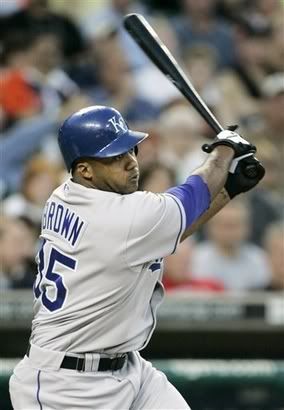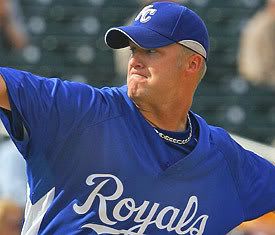Royals Notes: Brown and Bale
Despite having the option of giving playing time to younger and less-expensive outfielders like Shane Costa or Mitch Maier, the Royals appear to be considering the idea of bringing back the 33-year-old Brown for a fourth season in Kansas City. In 2007, Brown ate up $3.45 million of the team's payroll but didn't produce on the field, hitting a poor .257/.300/.347. When his corner-outfield position is taken into account, those numbers made him the worst hitter Buddy Bell trotted out on an everyday basis.

Brown has had a spot in the Kansas City outfield ever since he destroyed opposing pitchers in spring training of 2005 as an intriguing non-roster invitee. Despite his success in the minor leagues, I was initially against the minor-league journeyman being given an everyday job on the basis of his performance against Four-A pitchers in the Cactus League. However, I eventually came around to the idea. Here's what I wrote on March 24, 2005:
The point is that among the guys not making guaranteed money, Emil Brown just might be the best of a sorry lot. The likelihood is that he won’t hit and will therefore lose his job, but there’s definitely an Ibanez-esque upside, too. Let’s just hope that if the former proves to be true, the Royals won’t continue to hang on, waiting for the latter to happen.
For a couple of seasons, the former did prove to be true, as Brown posted better than an .800 OPS in 2005 and 2006. The key is that he did so making $355,000 in '05 and $1.775 million in '06, relative bargains given his production. In 2007, however, he made $3.45 million, and his 2008 salary would undoubtedly be even higher than that via arbitration.
Although it seems quite likely that Brown's abilities are on a downward slope, the question of whether or not he will ever be a productive hitter again isn't very important in this instance. The risk of allotting $4 million or more to a 33-year-old hitter coming off a terrible season greatly outweighs the reward, especially when the younger and cheaper Maier and Costa would jump at the chance to play. Brown's time as a Royal has come and gone.

The majority of Bale's career has come as a reliever, although he did make nine starts in 2003 with the Cincinnati Reds, posting a 4.47 ERA in 44 1/3 innings. On the downside, he allowed seven home runs, but had a great strikeout-to-walk ratio of 34-to-11. Bale's left-handedness and ability to miss bats is what drew general manager Dayton Moore to sign him away from the Japanese Central League last winter. He also has a history of success in the minor leagues:
It appears that the Royals have a talented pitcher who, to date, has not been given the opportunity to show what he can do. In the minor leagues, he did everything one could possibly want in a pitcher: He struck out batters at a superior rate, minimized walks, kept the ball in the park, and kept runs off the scoreboard. This is a "Moneyball" pitcher if there ever was one.
ERA IP SO BB HR WHIP
Minors 3.71 638.1 702 224 50 1.28
Majors 4.47 118.2 110 51 12 1.44
Given the Royals' limited payroll, the lack of good starting pitching on the free agent market, and need for rotation help behind Gil Meche, Brian Bannister, and Zack Greinke, allowing Bale to earn a spot in the rotation is one of the best ideas to come out of the Moore regime yet. Chances are he would make the front office look good.